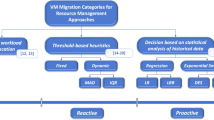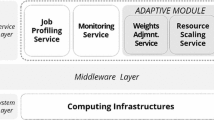Abstract
There are typically multiple heterogeneous servers providing various services in cloud computing. High power consumption of these servers increases the cost of running a data center. Thus, there is a problem of reducing the power cost with tolerable performance degradation. In this paper, we optimize the performance and power consumption tradeoff for multiple heterogeneous servers. We consider the following problems: (1) optimal job scheduling with fixed service rates; (2) joint optimal service speed scaling and job scheduling. For problem (1), we present the Karush-Kuhn-Tucker (KKT) conditions and provide a closed-form solution. For problem (2), both continuous speed scaling and discrete speed scaling are considered. In discrete speed scaling, the feasible service rates are discrete and bounded. We formulate the problem as an MINLP problem and propose a distributed algorithm by online value iteration, which has lower complexity than a centralized algorithm. Our approach provides an analytical way to manage the tradeoff between performance and power consumption. The simulation results show the gain of using speed scaling, and also prove the effectiveness and efficiency of the proposed algorithms.













Similar content being viewed by others
References
AMD Cool’n’Quiet technology. http://www.amd.com/us/products/technologies/cool-n-quiet/Pages/cool-n-quiet.aspx (2012)
Google unveils its container data center. http://www.datacenterknowledge.com/archives/2009/04/01/google-unveils-its-container-data-center/ (2012)
Andrew, L., Lin, M., Wierman, A.: Optimality, fairness, and robustness in speed scaling designs. ACM SIGMETRICS Perform. Eval. Rev. 38(1), 37–48 (2010)
Bansal, N., Pruhs, K., Stein, C.: Speed scaling for weighted flow time. In: Proceedings of the Eighteenth Annual ACM-SIAM Symposium on Discrete Algorithms, pp. 805–813. Society for Industrial and Applied Mathematics, Philadelphia (2007)
Barroso, L.: The price of performance. Queue 3(7), 48–53 (2005)
Barroso, L., Holzle, U.: The case for energy-proportional computing. Computer 40(12), 33–37 (2007)
Cao, J., Hwang, K., Li, K., Zomaya, A.: Optimal Multiserver Configuration for Profit Maximization in Cloud Computing (2012)
Chandrakasan, A., Sheng, S., Brodersen, R.: Low-power cmos digital design. IEICE Trans. Electron. 75(4), 371–382 (1992)
Chen, G., He, W., Liu, J., Nath, S., Rigas, L., Xiao, L., Zhao, F.: Energy-aware server provisioning and load dispatching for connection-intensive Internet services. In: Proceedings of the 5th USENIX Symposium on Networked Systems Design and Implementation, pp. 337–350 (2008). USENIX Association
Chen, L., Li, N., Low, S.: On the interaction between load balancing and speed scaling. In: ITA Workshop (2011)
Feng, W.: The importance of being low power in high performance computing. CTWatch Q. 1(3), 11–20 (2005)
Floyd, M., Ghiasi, S., Keller, T., Rajamani, K., Rawson, F., Rubio, J., Ware, M.: System power management support in the IBM power6 microprocessor. IBM J. Res. Dev. 51(6), 733–746 (2007)
Gandhi, A., Harchol-Balter, M., Das, R., Lefurgy, C.: Optimal power allocation in server farms. Perform. Eval. Rev. 37(1), 157 (2009)
George, J., Harrison, J.: Dynamic control of a queue with adjustable service rate. Oper. Res. 49(5), 720–731 (2001)
Graham, S., Snir, M., Patterson, C.: Getting up to Speed: The Future of Supercomputing. (2005), National Academy Press
Khan, S., Ahmad, I.: A cooperative game theoretical technique for joint optimization of energy consumption and response time in computational grids. Parallel and Distributed Systems. IEEE Trans. Parallel Distrib. Syst. 20(3), 346–360 (2009)
Krishna, C., Lee, Y.: Voltage-clock-scaling adaptive scheduling techniques for low power in hard real-time systems. In: Sixth IEEE Proceedings of Real-Time Technology and Applications Symposium, 2000. RTAS 2000, pp. 156–165. IEEE Press, New York (2000)
Lam, T., Lee, L., To, I., Wong, P.: Speed scaling functions for flow time scheduling based on active job count. In: Algorithms-ESA 2008, pp. 647–659 (2008)
Le Sueur, E., Heiser, G.: Dynamic voltage and frequency scaling: the laws of diminishing returns. In: Proceedings of the 2010 International Conference on Power Aware Computing and Systems, pp. 1–8. (2010). USENIX Association
Lee, Y., Krishna, C.: Voltage-clock scaling for low energy consumption in fixed-priority real-time systems. Real-Time Syst. 24(3), 303–317 (2003)
Lee, Y., Zomaya, A.: Energy conscious scheduling for distributed computing systems under different operating conditions. IEEE Trans. Parallel Distrib. Syst. 22(8), 1374–1381 (2011)
Leyffer, S.: Deterministic methods for mixed integer nonlinear programming. PhD University of Dundee (1993)
Li, K.: Optimal Power Allocation among Multiple Heterogeneous Servers in a Data Center. Sustainable Computing: Informatics and Systems (2011)
Li, K.: Optimal configuration of a multicore server processor for managing the power and performance tradeoff. J. Supercomput. 61(1), 189–214 (2012)
Li, K.: Scheduling precedence constrained tasks with reduced processor energy on multiprocessor computers. IEEE Trans. Comput. 61, 1668–1681 (2012). Special issue on energy efficient computing
Linden, G.: Marissa Mayer at Web 2.0 2006. http://glinden.blogspot.com/2006/11/marissa-mayer-at-web-20.html (2012)
Minas, L., Ellison, B.: Energy Efficiency for Information Technology: How to Reduce Power Consumption in Servers and Data Centers. (2009). Intel Press
Pallipadi, V.: Enhanced Intel Speedstep Technology and Demand-Based Switching on Linux. (2008). Intel Developer Service
Palomar, D., Chiang, M.: A tutorial on decomposition methods for network utility maximization. IEEE J. Sel. Areas Commun. 24(8), 1439–1451 (2006)
Pinheiro, E., Bianchini, R., Carrera, E., Heath, T.: Load balancing and unbalancing for power and performance in cluster-based systems. In: Workshop on Compilers and Operating Systems for Low Power, vol. 180, pp. 182–195 (2001)
Tian, Y., Lin, C., Yao, M.: Modeling and analyzing power management policies in server farms using stochastic petri nets. In: Proceedings of the 3rd International Conference on Future Energy Systems: Where Energy. Computing and Communication Meet, p. 26. ACM, New York (2012)
Wierman, A., Andrew, L., Tang, A.: Power-aware speed scaling in processor sharing systems. In: IEEE INFOCOM 2009, pp. 2007–2015. IEEE Press, New York (2009)
Yao, F., Demers, A., Shenker, S.: A scheduling model for reduced cpu energy. In: Proceedings of 36th Annual Symposium on Foundations of Computer Science, 1995, pp. 374–382. IEEE Press, New York (1995)
Zheng, X., Cai, Y.: Achieving energy proportionality in server clusters. Int. J. Comput. Netw. Commun. 1(1), 21 (2009)
Zheng, X., Cai, Y.: Optimal server allocation and frequency modulation on multi-core based server clusters. Int. J. Green Comput. 1(2), 18–30 (2010)
Zheng, X., Cai, Y.: Optimal server provisioning and frequency adjustment in server clusters. In: 39th International Conference on Parallel Processing Workshops 2010 (ICPPW), pp. 504–511. IEEE Press, New York (2010)
Zhong, X., Xu, C.: Energy-aware modeling and scheduling for dynamic voltage scaling with statistical real-time guarantee. IEEE Trans. Comput. 56(3), 358–372 (2007)
Author information
Authors and Affiliations
Corresponding author
Rights and permissions
About this article
Cite this article
Tian, Y., Lin, C. & Li, K. Managing performance and power consumption tradeoff for multiple heterogeneous servers in cloud computing. Cluster Comput 17, 943–955 (2014). https://doi.org/10.1007/s10586-013-0326-z
Received:
Accepted:
Published:
Issue Date:
DOI: https://doi.org/10.1007/s10586-013-0326-z




